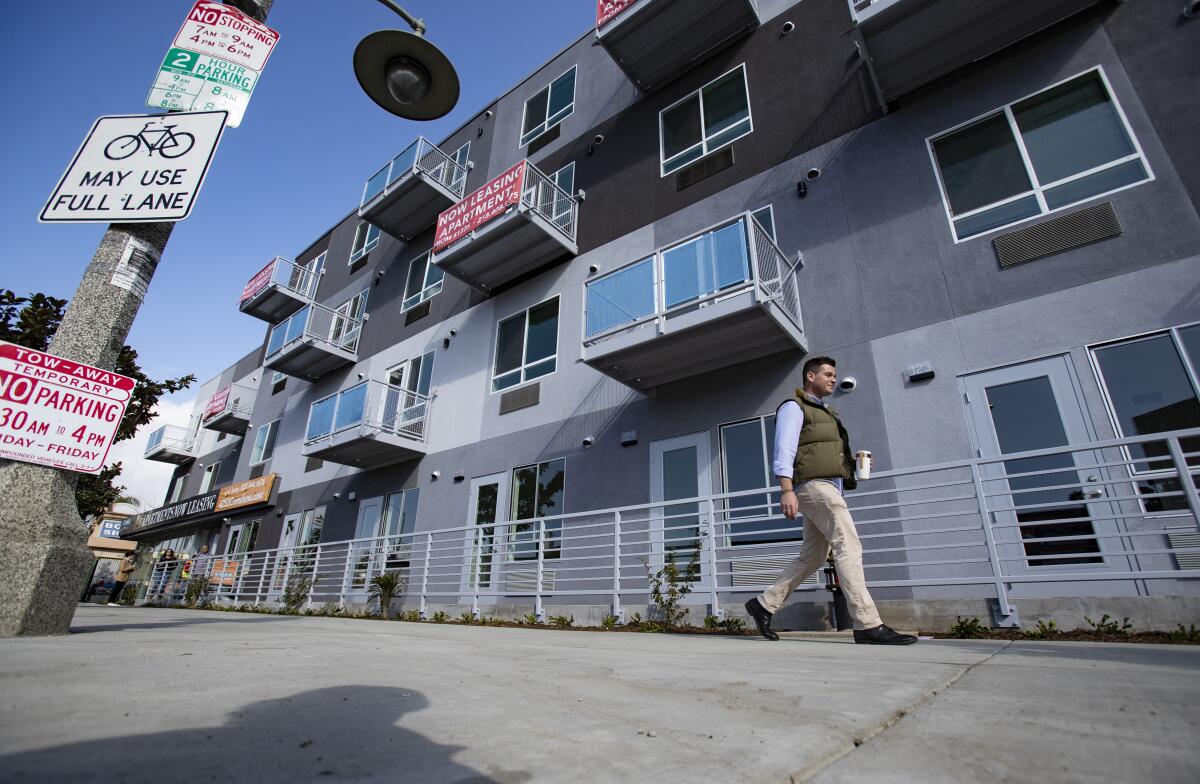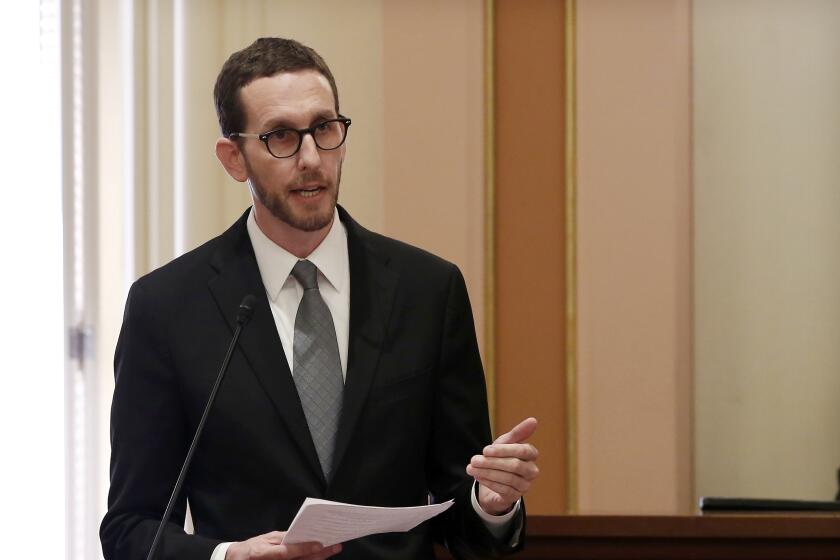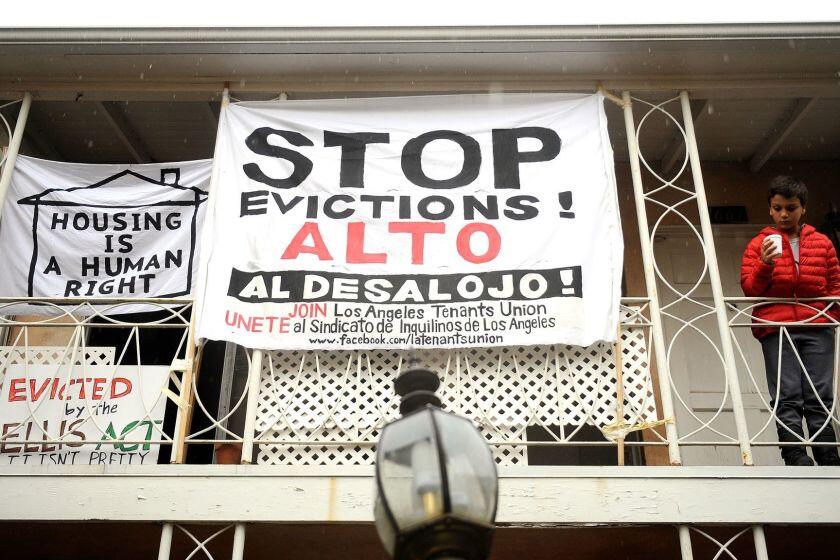California lawmakers vote to increase housing in cities falling short of construction goals

- Share via
California lawmakers approved legislation on Monday to expand a housing law that has led to the construction of thousands of new homes, despite initial opposition from labor unions and environmental groups.
Senate Bill 423 would extend by a decade a state housing law set to expire in 2026 that lets developers skip much of the bureaucratic process often blamed for blocking construction of multifamily projects, though only in cities that have fallen behind on state-mandated housing goals. The legislation now heads to Gov. Gavin Newsom, who has until Oct. 14 to sign or veto hundreds of bills.
“If you are looking for an opportunity to support housing in your community, I can assure you this is the most consequential vote you will have this year, period, full stop,” Assemblymember Buffy Wicks, an Oakland Democrat and chair of the Housing and Community Development Committee, said Thursday before a vote in her chamber. “This is the most important housing bill that we are going to put on the governor’s desk.”
A 2018 California housing law has helped create more than 18,000 new homes. But that’s still far short of what’s needed to dig the state out of a severe shortage.
The Assembly approved the bill on a bipartisan 52-8 vote, and the Senate passed it 27 to 7.
When state Sen. Scott Wiener (D-San Francisco) introduced SB 423 in February, it faced fierce opposition from some of the state’s most influential labor unions, including the State Building and Construction Trades Council of California, an organization that has aggressively and successfully opposed housing proposals that lacked rigorous worker protections.
Though SB 423 mandates that housing developers offer union-level wages and some healthcare benefits, the trades council and dozens of local and state labor groups worried that the protections were inadequate and would fail to safeguard construction workers.
Wiener addressed those concerns earlier this year with amendments that strengthened labor regulations on certain projects, easing some opposition. He had help from the California Conference of Carpenters, which made an unusual break from other statewide labor unions to sponsor SB 423.
“Without a doubt, housing affordability is the most destabilizing issue facing Californians. Working families, struggling from paycheck to paycheck, are staring homelessness in the face,” Daniel Curtin, director of the California Conference of Carpenters, wrote in a statement. “We look forward to making the case with Governor Newsom for his signature on this year’s major housing legislation. We’re proud to have played a role in this effort.”
Other roadblocks included opposition from environmental groups, which raised issues with parts of the bill that would allow construction in certain coastal and wildfire zones.
The California Coastal Commission this summer argued against SB 423’s expansion into coastal areas exempted from development in the original law. The commission argued that more construction on the coast could worsen climate outcomes amid sea level rise and a changing environment.
Areas that could see new multifamily housing projects under SB 423 include wealthier coastal locations such as Carmel-by-the-Sea, Malibu, Santa Monica, Venice, western San Francisco and San Diego.
“I support affordable housing,” Assemblymember Al Muratsuchi (D-Rolling Hills Estates) said during the Assembly debate. “But not at the expense of California’s iconic coastline, and not at the expense of protecting Californians from wildfires.”
Senate Bill 4 would let religious groups and nonprofit colleges build homes on excess land, but lawmakers will need to make a deal with unions on the proposal.
Wiener accepted minor amendments to the bill to clarify that it would not apply to areas that are “environmentally sensitive or hazardous, such as those that could be affected by sea level rise.” Dozens of cities still oppose SB 423, including several in Los Angeles County and other coastal cities in Southern California. Some of their concerns extend beyond environmental impacts and into local control over housing decisions in their communities.
The League of California Cities, which lobbies on behalf of hundreds of local governments in the Capitol, is particularly concerned about a provision of SB 423 that would let the California Department of General Services step in and develop housing on state-owned property in local jurisdictions.
“And they’re not obligated to follow a lot of rules at the local level, like any other developers,” said Jason Rhine, a lobbyist for Cal Cities.
A recent UC Berkeley Terner Center for Housing Innovation report found that the 2017 law has helped lead to more than 18,000 proposed new units in California, nearly two-thirds of which are considered 100% affordable. It’s a small dent in a state that must plan for 2.5 million new homes over the next eight years, with at least 1 million set aside for low- to very low-income households.
Still, housing experts say it’s an important step toward alleviating a housing shortage that’s helped drive a homelessness crisis and made it very difficult for middle- and low-income residents to find affordable places to live in California.
A 2018 California housing law has helped create more than 18,000 new homes. But that’s still far short of what’s needed to dig the state out of a severe shortage.
Senate Bill 423 helps build on a “track record of success,” said Ray Pearl, executive director of the California Housing Consortium, one of the measure’s sponsors.
“There is no silver bullet. There is no one bill that is going to solve this,” Pearl said. “But each bill hopefully makes a dent, points us in the right direction, prioritizes the production of affordable housing.”
The Senate easily approved another major housing proposal on Monday, also by Wiener, that would allow nonprofit colleges and faith organizations such as mosques, synagogues and churches to quickly build affordable housing on their properties. That measure, Senate Bill 4, is expected to free up some 171,000 acres of land for development of affordable housing projects, according to another report from the UC Berkeley Terner Center for Housing Innovation.
“Enacting SB 4 and 423 will add powerful tools to our arsenal in combating the housing crisis,” Wiener said in a statement after the votes. “Californians overwhelmingly want to see these homes built, which is why both bills passed by a wide margin with bipartisan support.”
Lawmakers didn’t limit their focus on housing issues to production of new homes. They also passed several tenant-protection bills to safeguard renters against evictions and expensive security deposits.
California lawmakers introduced bills this year to strengthen rules against high rents and evictions. Landlords and realtors are fighting back.
Assembly Bill 12 would ban landlords from charging more than one month’s rent as a security deposit. Supporters of AB 12 argue that rental housing is already too costly for many tenants in California, and that charging thousands of extra dollars upfront for a unit worsens the problem.
Landlord groups and Realtors opposed AB 12, saying that security deposits protect owners from risks associated with renting their homes, such as incurring property damage and then having to pay for repairs. Several moderate Democrats joined Republicans in opposing the measure or abstained.
Senate Bill 567, which would strengthen a 2019 anti-eviction law, also faced resistance from business groups, apartment associations and moderate Democrats.
State Sen. María Elena Durazo (D-Los Angeles) struck a late deal to ease some of the opposition with amendments that would delay implementation until April 1 and relax some of the penalties on landlords, though the bill still includes new oversight of eviction processes.
More to Read
Sign up for Essential California
The most important California stories and recommendations in your inbox every morning.
You may occasionally receive promotional content from the Los Angeles Times.

















